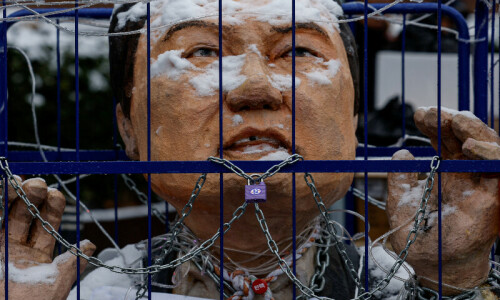HURTLING as we are towards a Trumpian plutocracy, why not take 90 minutes or so to be pleasantly reminded that not all billionaires are just heartless cabinet nominees?
In any other context, Peter Kunhardt’s HBO documentary Becoming Warren Buffett would seem like too much of a tongue bath — a warm portrait that verges on fawning and honours the success, personality quirks and eventual magnanimity of the famous “Oracle of Omaha”, who amassed enough billions through seven decades of shrewd investing to buy all of us many times over.
Now, as a nation braces itself for an even further widening of the gap between rich and poor, Becoming Warren Buffett can also be seen as a case study in recognising both virtue and value. Those who love money and retain a sure faith in the concept of the self-amassed fortune will have all their hopes in capitalism affirmed here; at the same time, those who believe that the hearts of old men can soften just as much they are reputed to harden will be encouraged by the backstory of how Buffett decided, in 2006, to part with all but a tiny sliver of his net worth (currently estimated around $75 billion).
Watching someone decide to give that much money away is a rare thing, especially someone who, as Becoming Warren Buffett tenderly reveals, still counts out his nickels each morning at the McDonald’s drive-through and chooses his meagre breakfast item based on the previous day’s stock-market performance. Kunhardt’s camera follows Buffett through his daily routines within the comfortably drab Berkshire Hathaway headquarters in Omaha, where the billionaire spends most of his days sitting and absorbing information — most of it from the day’s newsprint.
“I’m pretty well depreciated,” Buffett, now 86, observes. “I’m getting down to salvage value.”
Becoming Warren Buffett is precisely what its title offers: Aided by Buffett’s remarkably well-adjusted three children and his still-surviving siblings, we get a picture of the intelligent, instinctively entrepreneurial child of the Great Depression, the son of a Nebraska congressman. Li’l Warren loved nothing more than to count pennies and calculate compounding interest. As both a film subject and still highly influential market-mover, Buffett is uncannily good at making his success look easy and matter-of-fact. Of course it isn’t.
Buffett’s children politely yet honestly appraise their father’s inability (and occasional unwillingness) to show love and attention when they were young, which eventually led his spunky, generous wife, Susie, to leave him in the 1970s, after the children were grown.
“Well, there really isn’t much to say about that,” Buffett says. (Um, sure there is: Susie and Warren never divorced; she asked a neighbour friend, Astrid Menks, to look in on Warren occasionally. Astrid and Warren hooked up and everyone was satisfied with an arrangement that lasted until Susie’s death from cancer in 2004. At which point Warren married Astrid.)
After Susie’s death, Buffett began to realise that he had for too long put off the philanthropic gestures he always intended. Aided by his friends Bill and Melinda Gates, he publicly pledged to give it away. (A long list of organisations and causes that have benefited from Buffett’s largesse appears at the end of the film.)
“Sometimes there aren’t any good answers with human problems,” Buffett says at one point in the film. “There’s almost always an answer with money.” Buffett’s legacy will likely be somewhere between the two — answering and aiding quite a number of human problems with the fortune he leaves behind.
By arrangement with The Washington Post
Published in Dawn January 31st, 2017















































Dear visitor, the comments section is undergoing an overhaul and will return soon.